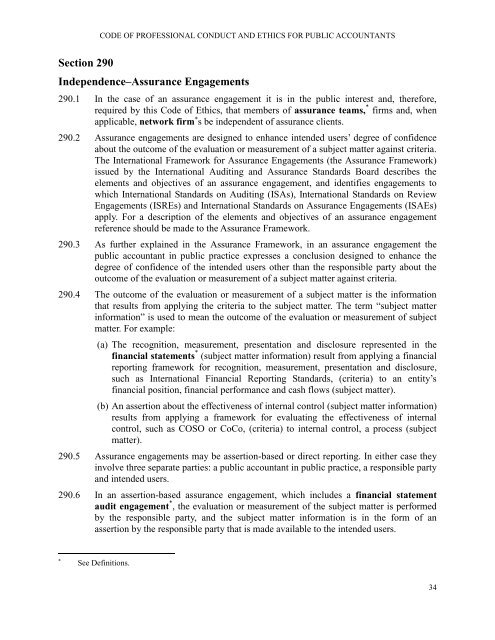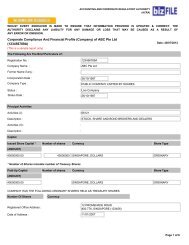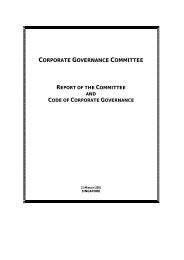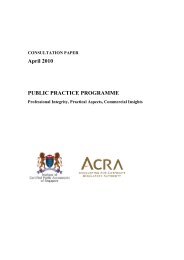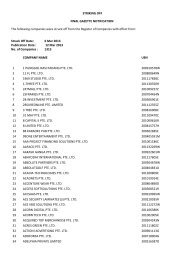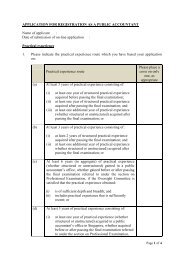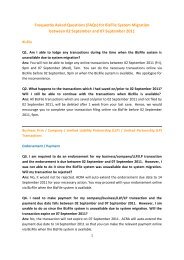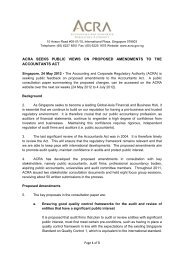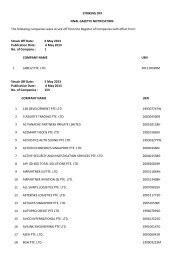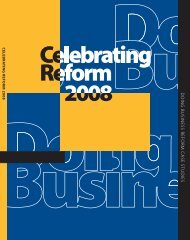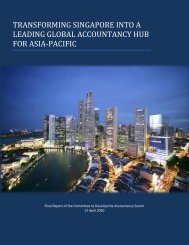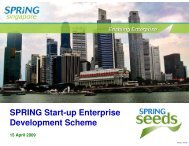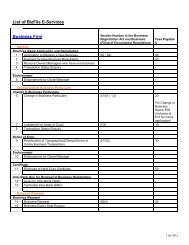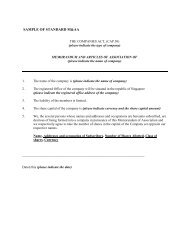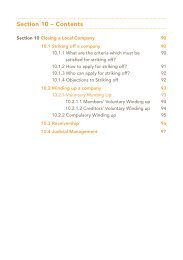Exposure Draft - ACRA
Exposure Draft - ACRA
Exposure Draft - ACRA
Create successful ePaper yourself
Turn your PDF publications into a flip-book with our unique Google optimized e-Paper software.
CODE OF PROFESSIONAL CONDUCT AND ETHICS FOR PUBLIC ACCOUNTANTS<br />
Section 290<br />
Independence–Assurance Engagements<br />
290.1 In the case of an assurance engagement it is in the public interest and, therefore,<br />
required by this Code of Ethics, that members of assurance teams, * firms and, when<br />
applicable, network firm s be independent of assurance clients.<br />
290.2 Assurance engagements are designed to enhance intended users‘ degree of confidence<br />
about the outcome of the evaluation or measurement of a subject matter against criteria.<br />
The International Framework for Assurance Engagements (the Assurance Framework)<br />
issued by the International Auditing and Assurance Standards Board describes the<br />
elements and objectives of an assurance engagement, and identifies engagements to<br />
which International Standards on Auditing (ISAs), International Standards on Review<br />
Engagements (ISREs) and International Standards on Assurance Engagements (ISAEs)<br />
apply. For a description of the elements and objectives of an assurance engagement<br />
reference should be made to the Assurance Framework.<br />
290.3 As further explained in the Assurance Framework, in an assurance engagement the<br />
public accountant in public practice expresses a conclusion designed to enhance the<br />
degree of confidence of the intended users other than the responsible party about the<br />
outcome of the evaluation or measurement of a subject matter against criteria.<br />
290.4 The outcome of the evaluation or measurement of a subject matter is the information<br />
that results from applying the criteria to the subject matter. The term ―subject matter<br />
information‖ is used to mean the outcome of the evaluation or measurement of subject<br />
matter. For example:<br />
(a) The recognition, measurement, presentation and disclosure represented in the<br />
financial statements * (subject matter information) result from applying a financial<br />
reporting framework for recognition, measurement, presentation and disclosure,<br />
such as International Financial Reporting Standards, (criteria) to an entity‘s<br />
financial position, financial performance and cash flows (subject matter).<br />
(b) An assertion about the effectiveness of internal control (subject matter information)<br />
results from applying a framework for evaluating the effectiveness of internal<br />
control, such as COSO or CoCo, (criteria) to internal control, a process (subject<br />
matter).<br />
290.5 Assurance engagements may be assertion-based or direct reporting. In either case they<br />
involve three separate parties: a public accountant in public practice, a responsible party<br />
and intended users.<br />
290.6 In an assertion-based assurance engagement, which includes a financial statement<br />
audit engagement * , the evaluation or measurement of the subject matter is performed<br />
by the responsible party, and the subject matter information is in the form of an<br />
assertion by the responsible party that is made available to the intended users.<br />
<br />
See Definitions.<br />
34


